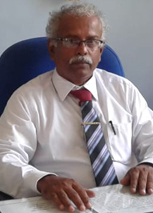ASIA-PACIFIC REGIONAL ECOTOURISM CONFERENCE (APREC 2009)
'The first ever Asia-Pacific Regional Ecotourism Conference (APREC 2009),
which was held in Colombo, Sri Lanka from 7-8th May, 2009 has been successfully concluded with an endorsement of Colombo Declaration unanimously
accepted by all Sri Lankan and Foreign Delegates attended. Furthermore, it was tentatively decided to hold the next APREC Conference in Nepal, in
2010.
The delegates who have participated at the Asia-Pacific Regional Ecotourism Conference (hereinafter called APREC 2009) hosted by Sri Lanka Ecotourism
Foundation (SLEF), in partnership with Sri Lanka Tourism and The International Ecotourism Society (TIES) held in Colombo, Sri Lanka from 7-9th May,
2009, unanimously resolved and declared;
01. APREC 2009 is a starting and turning point of promoting community based ecotourism in the Asia Pacific Region (hereinafter called APR)in an
organized manner and under the banner of 'feel the community proud through tourism business' The APR aims to promote and strengthen Community
Based Ecotourism (CBE) in the APR and to increase the competitiveness of CBE products and services worldwide, inter-and intra-regional tourism
markets"
02. It is resolved, that all governments of the APR should always, support and encourage tourism agencies which comes under their purview to
recognize community based ecotourism institutions and projects and incorporate in to their master plans, marketing plans and tourism products
promoted. Participating delegates of APREC 2009 observed the values given to the community based ecotourism by the respective governments and
tourism agencies operated in the APR up to now is very low.
03. APREC identified and resolved, a full fledged Research and Training Institute on Sustainable/Ecotourism for the Asia-Pacific Region is very
essential in bringing together the Ecotourism expertise of the Asia-Pacific region, with a view to dissemination of information on environmental
and biodiversity conservation, collecting information of community based ecotourism projects in the region. The proposed centre could educate the
travel industry members in developing and marketing Ecotourism products, and will train interpreters and guides, offer cost effective green
certification, eco-labeling, accreditation etc. APREC of the view, this sort of institution would carry following programmes in strengthening
of the ecotourism and sustainable tourism fabric in the Asia-Pacific region;
- Develop and conduct training, research, and education programs on, - Ecotourism planning and management,
- Ecotourism marketing
- Design & development of ecolodges
- Training of eco-guides and interpreters
- Launch a 'Distance Education Programme in Ecotourism',
- Support academic sector in Ecotourism research
- Locate financial resources to support research
APREC appreciated and valued the good work already completed by the Sri Lanka Ecotourism Foundation (SLEF) since year 2002, in the direction
of establishing of a Research and Training Institute for the Asia-Pacific Region. APREC unanimously resolved to support SLEF in formation and
building up of Research and Training Institute for the Asia-Pacific Region based in Sri Lanka.
04. APREC 2009 understands that the Asia Pacific Region is a vast region, covering some 2.8 billion hectares of land area, or approximately
22 percent of the global land area with an approximate population that represents 57% the world population and nearly 4.25 billion people
and more than 55 countries. APREC resolved to establish Asia-Pacific Regional Ecotourism Council (APREC) and Asia-Pacific Regional Network
(APRN) with a view to promote ecotourism and get more and more countries, like minded organizations which are interested in joining the
APREC folds. It was resolved to establish Asia-Pacific Regional Network (APRNW) Secretariat based in Nepal, because networking among the
countries of the region is very essential to develop sustainable and ecotourism, dissemination of information, share market potential,
improve new community based tourism products, exchange expertise within the region etc. APREC appreciated the initiatives taken, activities
and programmes already implemented by Sustainable Tourism Network in Nepal and Sewalanka Foundation in Sri Lanka in this direction and
to support Nepal and Sewalanka Foundation to formulate strong 'Network' for the Asia-Pacific Region. Bangladesh also could be included as a
coordinator of the APRNW
05. APREC appreciated the initiatives already taken by CBT-I, in Thailand to develop and promote community based ecotourism products in the
Asia-Pacific Region. APREC resolved to support the CBT-I to further development of its work through the proposed Asia-Pacific Regional Network
(APRNW). Through the proposed APREC Secretariat, it is resolved to get the assistance and required guidelines from CBT-I and to lobby regionally
and internationally to support APREC to build up web-based strong marketing hub for the region.
06. It is resolved to formulate Asia-Pacific Regional Ecotourism Council (APREC) and an APREC Secretariat to coordinate APREC follow up programmes.
In this regard it was decided to establish the APREC with the following participating countries. Chair- Japan, Mr. Masaru Takayama, Board Member,
The International Ecotourism Society (TIES) and CEO, Japan Ecolodge Association Vice Chair; Bangladesh; Prof; Monzurul Ul Huq Secretary General and
Secretariat; Palitha Gurusinghe, President, Sri Lanka Ecotourism Foundation, Sri Lanka Deputy Secretary General and Network Coordinator; Mr. Bijaya
Pradhan, Sustainable Tourism Network, Nepal Deputy Network Coordinator; Dr. Harsha Kumara Nawaratna, Chairman, Sewalanka Foundation, Sri Lanka
07. APREC resolved to study the importance of marine ecotourism structure of the Asia-Pacific Region and address the challenging issues and learn how to
manage marine ecotourism through sustainable practices. About 55,000 small and big islands are located in and around the Pacific Ocean and Indian Ocean
creating hundreds of thousands kilometers of beautiful coastal shores. These beaches attract travelers from all over the world. In the context of pleasure
and beach tourism many forgets the importance of marine ecotourism in the Asia-Pacific Region. Some of the islands are threatened with high carrying
capacity while some of the islands with pristine beauty are occupied by indigenous communities with less population or still uninhabited. The livelihoods
of most of the island nations of pacific region are fishing, though the islands are rich of various other mineral and agricultural resources. However,
in general, most of the islands are heavily depending on tourism. While some countries are focusing sustainable practices while many struggling with
challenges in legislative policies, public awareness, capacity building, economic constraints, legal enforcements etc. In this context, APREC resolved to
support Koh Yao Noi Community-Based Tourism Club, Thailand, to establish Marine Ecotourism Study Centre in Koi ya Noi, in Thailand, under the leadership
of Mr. Dusit Buttree (Bang Bao) the Coordinator/Community Leader. In this exercise, the Eastern Provincial Council, Sri Lanka could work directly with the
Koh Yao Noi Community-Based Tourism Club in developing sustainable practices of fishing and coastal tourism potential for the Asia-Pacific Region and
dissemination of information in the region
08. It was also unanimously decided to invite all ecotourism associations active in the region to join the newly formed Asia-Pacific Regional Ecotourism
Council (APREC). it was decided to expand the scope of the APREC and add more office bearers in charge of different activities and programmes undertaken
by APREC in different subject areas once new members join the Organization in the future















